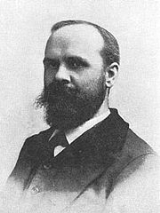
individualist anarchism
(which he called "unterrified Jeffersonianism") in the 19th century, and editor and publisher of the individualist anarchist periodical Liberty.
Tucker says that he became an anarchist at the age of 18. Tucker's contribution to American individualist anarchism was as much through his publishing
as his own writing.
Socialism, on the contrary, extends its function to the description of society as it should be, and the discovery of the means of making it what it should be.![]()
First, then, State Socialism, which may be described as the doctrine that all the affairs of men should be managed by the government, regardless of individual choice. Karl Marx|Marx, its founder, concluded that the only way to abolish the class monopolies was to centralize and consolidate all industrial and commercial interests, all productive and distributive agencies, in one vast monopoly in the hands of the State.![]()
To the individual can belong only the products to be consumed, not the means of producing them. A man may own his clothes and his food, but not the sewing-machine which makes his shirts or the spade which digs his potatoes.![]()
Product and capital are essentially different things; the former belongs to individuals, the latter to society.![]()
All freedom of trade must disappear. Competition must be utterly wiped out. All industrial and commercial activity must be centered in one vast, enormous, all-inclusive monopoly. The remedy for monopolies is monopoly.![]()
This brings us to Anarchism, which may be described as the doctrine that all the affairs of men should be managed by individuals or voluntary associations, and that the State should be abolished.![]()

